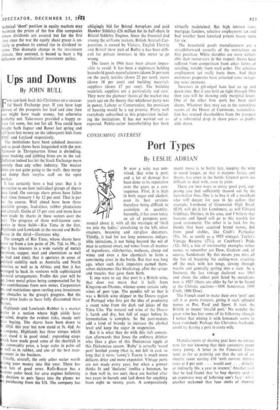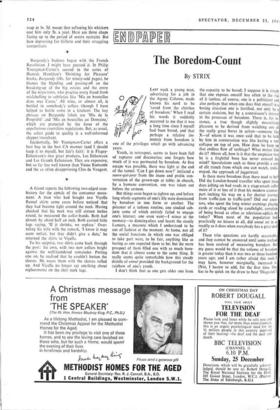Port Types
CONSUMING INTEREST
By LESLIE ADRIAN
IF ever a wine was con- trived, that wine is port, and a lot of damage has been done to its reputation over the years as a con- sequence. First, it is high in both sugar and alcohol, even its best versions therefore being difficult to assimilate in quantity. Secondly, it has even today an air of pompous cere- monial about it, with all the mystique of 'shall we join the ladies,' circulating to the left, silver strainers, beeswing and cut-glass decanters. Thirdly, it had for too long numerous indiges- tible imitations, it not being beyond the wit of man to concoct sweet, red wines from all manner of ingredients, elderberries, molasses, cheap red wines and even a few chemicals to form a convincing crust in the bottle. But that was long ago, when such dark impostors earned them- selves nicknames like blackstrap, after the syrups and treacles that gave them birth.
one were to say that port is a British wine, that does not mean that it hails from Kingston-on-Thames, whence come certain ruby wines of port type. The pundits tell us that it was a British wine shipper in the Douro region of Portugal who first got the idea of producing a sweet wine from the dark red juices of the Tinta Cao. The natural red wine of the Douro is harsh and dry, but full of sugar before its fermentation is complete. So the port-makers add a kind of brandy to increase the alcohol level and keep the sugar in suspension.
But it is what they do with this rich concoc- tion afterwards that foxes the ordinary drinker who likes a glass of this Dickensian tipple at this Dickensian season. 'Ruby' is actually 'wood port' bottled young (that is, not left in cask so long that it turns 'tawny). Tawny is much more delicate, drier and more expensive. Vintage ports are not made every year, but when a grower thinks fit and 'declares' (unlike a batsman, he is then well in, not out), these are bottled after two years in barrels and laid down for anything from eight to twenty years. A comparatively recent move is to bottle late, keeping the wine in wood longer, so that it matures faster, and throws less crust in the bottle. Crusted ports are difficult to deal with, even in print.
There are two ways to enjoy good port, sup- posing you feel sufficiently thawed out by the Saturnalian fires. One is to buy it off a merchant who will' decant for you in his cellars (fot example, Lovibond of Greenwich High Road, SEIO, will do it for Londoners, as will Edward Giddings, Devizes, in his area, and I believe that Saccone and Speed will go to this trouble for good customers). The other is to look for the blends that have acquired brand names, but from good stables, like Croft's Particular (31s. 3d., as costly as a 1955 vintage), Taylor's Vintage Reserve (27s.), or Cockburn's Pride (32s. 6d.), a trio of trustworthy examples (other names to remember are Dow, Graham and, of course, Sandeman). By this means you miss all the fun of breaking the sealing-wax, cracking off the neck with hot tongs, sieving through muslin and generally getting into a state. As a footnote, the last vintage declared was 1963 and about the oldest port listed by merchants now is 1927 (there are older by far to be found at the Christie auctions-1896 Sandeman, 1900 Croft, 1896 Dow).
The French used to make their own 'port' and sell it as porto francais, giving it such splendid names as Por, Pord and Sport. It took the British to invent 'invalid port.' No wonder the great wine has lost some of its following (though I notice that mixing it with lemonade seems to have vanished). Perhaps this Christmas husbands could try having a port in every wife.
Manufacturers of shaving gear have no excuse now for not knowing that their customers count every penny. A letter in the Financial Times went as far as pointing out that the use of an electric razor costing £10 'with current interest rates at 8 per cent . . . would cost . . . directly or indirectly 16s. a year in interest.' Another said that he had found that 'to buy shaving soap k an expensive way of lathering one's face.' while another reckoned that four sticks of shaving
soap at Is. 3d. meant that softening his whiskers cost him only 5s. a year. Here are three chaps facing up to the period of severe restraint. But how depressing for Gillette and their struggling competitors.
Burgundy's badness began with the French Revolution. I might have guessed it. In Philip Youngman-Carter's second in the series of Hamish Hamilton's 'Drinking for Pleasure' books, Burgundy (18s. for ninety-odd pages), he blames the blending and passing-off on the breaking-up of the big estates and the entry of the negociants, who practise every fraud from mislabelling to subtleties like `Mis en bouteilles dans mes Caves.' All wine, or almost all, is bottled in somebody's cellars (though I have helped to bottle some in a kitchen). The key phrases on Burgundy labels are `Mis de la Propridte and `Mis en bouteilles au Domaine,' which are protected by the force of the appellations controlees regulations. But, as usual, the safest guide to quality is a well-informed shipper/ merchant.
Incidentally, Mr Youngman-Carter offers a best buy in the best CA manner (and I should keep it to myself, but fair's fair): it is Flagey- Echezeaux's two great products, Les Echezeaux and Les Grands Echezeaux. They are expensive, but so far less well known than Vosne Reman& and the so often disappointing Clos de Vougeot.
A friend reports the following two-edged case- history for the annals of the consumer move- ment. A man who had bought two Viyella flannel shirts some years before noticed that they had become tight around the neck. Having checked that his neck was still sixteen inches round, he measured the collar-bands. Both had shrunk by about half an inch. Both carried little tags saying, 'If it shrinks, we replace.' Over- ruling his wife with the remark, 'I know it may seem unfair, but they didn't give a date,' he returned the shirts to Viyella.
To his surprise, two shirts came back through the post: his own, with two new collars bright against the well-laundered remainder. Putting one on, he realised that he couldn't button the sleeves. He wears them with the sleeves rolled up. And Viyella no longer say anything about replacements on the shirt neck tags.































 Previous page
Previous page